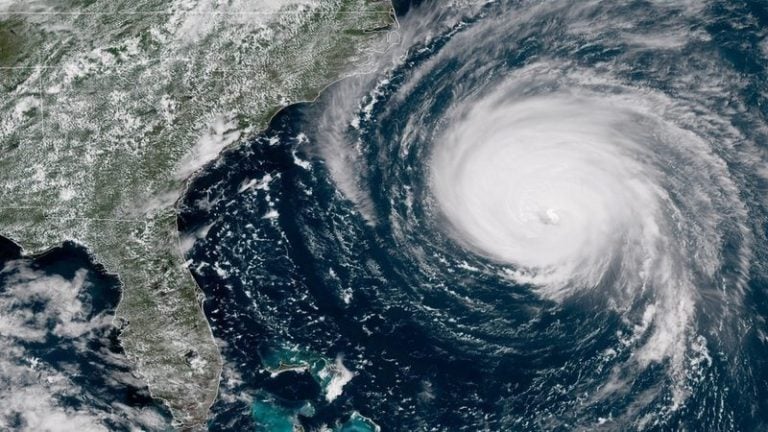Waterkeeper Alliance offering patrol opportunities in Florence impacted areas
By: Waterkeeper Alliance

Waterkeeper Alliance and Waterkeeper groups in the Carolinas are preparing to document the potentially devastating aftermath of Hurricane Florence. Waterkeepers will be monitoring conditions at coal ash pits, factory swine and poultry operations, and other pollution threats to the states’ waterways. Video and images will be available here.
Hardest hit will likely be the Neuse, Cape Fear, Lumber, and Pee Dee river basins. The Neuse and Cape Fear have the highest concentration of massive industrial swine sites. Both coal-fired plants and industrial animal agriculture operations store waste in unprotected open-air pits and cesspools, some of which are larger than football fields.
“We have been working in North Carolina for two decades to push the state and industry to handle waste more responsibly,” said Will Hendrick, Waterkeeper Alliance staff attorney and manager of the Pure Farms, Pure Waters campaign. “These industries’ irresponsible waste management practices are a threat to the environment even under blue skies. Because they dragged their feet on solutions, that threat is now exacerbated.”
As soon as it is safe to fly, Waterkeeper Alliance and Waterkeeper Organizations will be overflying power plants and industrial agriculture operations to document any flooding. Ground patrols will also commence as soon as they can be safely conducted.
North Carolina environmental agencies permitted swine lagoons and coal ash ponds to be sited in the floodplains of the state’s rivers. The result is that when storms with high rainfall occur, these industrial waste sites flood and rivers become devastatingly polluted with coal ash and waste from industrial animal production facilities.
“During Hurricane Matthew, coal ash ponds at the H.F. Lee Power Plant flooded, spilling toxic coal ash into the river. Since then, not a single shovel of coal ash has been removed from those pits,” said Upper Neuse Riverkeeper Matthew Starr. “Flooding from Hurricane Matthew also spilled waste from feces and urine from massive swine cesspools into our water. As with the coal ash, no action has been taken to remove that threat.”
In 1999, flooding from Hurricane Floyd dumped massive amounts of raw animal waste from industrial meat production facilities into the Neuse River.
As climate change causes more and more of these devastating weather events, we simply cannot afford these continued assaults upon our waterways and communities.
Click here to read about our North Carolina “Fields of Filth” report and connect to a map of all the industrial poultry and swine farms in North Carolina.
As the storm moves inland, Waterkeeper groups in South Carolina will be monitoring threats in that state. Fortunately, unlike Duke Energy, the utilities in that state have removed much of the coal ash from riverside impoundments and there are far fewer, and less concentrated, industrial animal agriculture operations. However, structural failure of dam infrastructure is a major concern in South Carolina.
Throughout the storm, Waterkeeper groups in the Carolinas will continue to monitor threats to water quality in addition to the aforementioned high priority targets.
The Waterkeeper Alliance Rapid Response initiative provides trusted and independent information following disasters on our waterways. In a climate of lax federal regulations and budget cuts to state departments of environmental conservation, the need for Waterkeeper Organizations and Waterkeeper Affiliates to speak truth about the devastating impacts of water emergencies on communities has never been greater. Waterkeeper groups will remain involved as long as necessary in order to assure that proper clean-up, mitigation, and enforcement is completed.
**Photo by NOAA/STAR